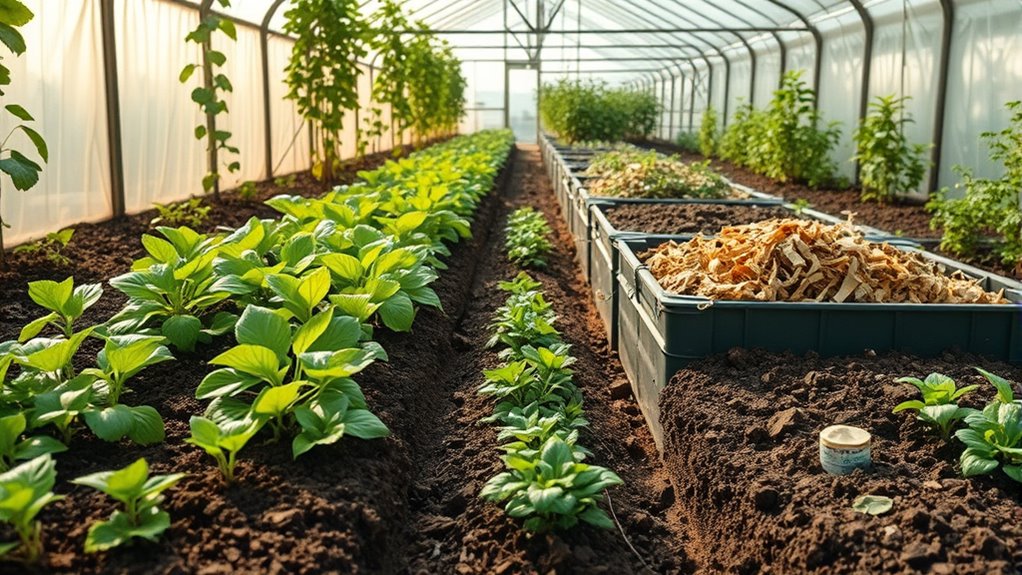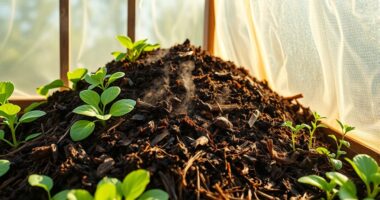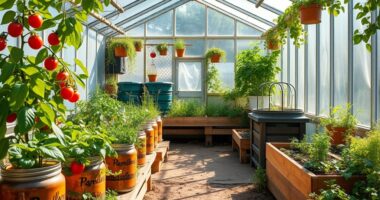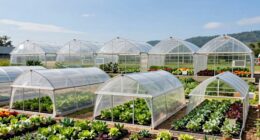To support sustainable soil in your greenhouse, incorporate composting and organic fertilizers. By adding compost, you encourage a diverse microbial community that improves nutrient cycling and soil structure. Organic fertilizers boost microbial activity and enhance nutrient availability, reducing reliance on chemicals. Maintaining soil pH and avoiding compaction also helps microbes thrive. Embracing these practices guarantees long-term soil vitality and healthier plants; continue exploring to discover more effective ways to optimize your soil ecosystem.
Key Takeaways
- Composting produces nutrient-rich humus that supports diverse soil microbial communities in greenhouses.
- Organic fertilizers enhance nutrient availability and stimulate microbial activity for healthier soil.
- Incorporating organic matter improves soil structure, fertility, and resilience against degradation.
- Maintaining optimal soil pH and practicing soil conservation methods sustain microbial functions long-term.
- Regular monitoring of soil health guides effective use of compost and organic fertilizers for sustainability.
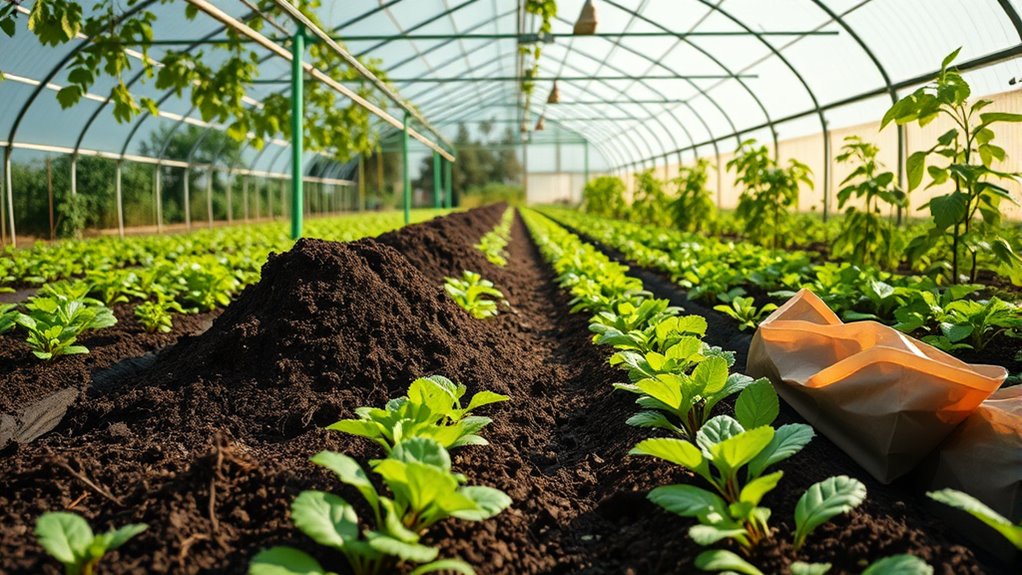
Have you ever wondered how we can keep our soil healthy for future generations? The answer lies in understanding and nurturing the soil microbiome and practicing effective organic matter management. These elements are essential for sustainable soil practices, especially in greenhouse environments where maintaining soil vitality directly impacts plant health and productivity. The soil microbiome, a complex community of microorganisms, plays a pivotal role in nutrient cycling, disease suppression, and organic matter decomposition. When you support this microbial diversity, you help create a resilient soil ecosystem that naturally sustains plant growth. Organic matter management involves adding compost, cover crops, and other organic materials to enrich the soil, fostering a thriving microbiome and improving soil structure. Incorporating popular organic fertilizers can further enhance microbial activity and nutrient availability. Regularly monitoring soil microbial diversity can help you assess the health of your soil ecosystem and guide your management practices.
In a greenhouse setting, your goal should be to foster a healthy soil microbiome by regularly incorporating organic matter. Composting is a powerful tool for this purpose. When you compost plant residues, food scraps, and other organic materials, you produce a nutrient-rich humus that boosts microbial activity. This organic matter acts as food for beneficial microbes, encouraging their proliferation and diversity. As microbes break down organic matter, they release essential nutrients in forms accessible to plants, reducing the need for chemical fertilizers. By maintaining a steady supply of organic material, you guarantee that the soil remains alive and capable of supporting healthy plant growth over time. Additionally, soil health practices can help mitigate the effects of soil degradation and enhance sustainability in greenhouse cultivation. Implementing soil conservation techniques, such as contouring and mulching, further supports this goal. Maintaining proper soil pH and avoiding compaction are also critical to supporting microbial functions and overall soil health.
Frequently Asked Questions
What Are the Costs Associated With Implementing Composting Systems?
When considering implementing composting systems, you should evaluate the financial investment needed for setup, including bins, tools, and possibly new infrastructure. Maintenance expenses are also important, as you’ll need to regularly turn the compost and monitor conditions. While initial costs can vary based on system size and complexity, ongoing expenses are generally manageable, and the long-term savings on fertilizers and waste disposal make composting a cost-effective choice for sustainable practices.
How Long Does It Take for Compost to Become Usable Fertilizer?
You might wonder how long it takes for compost to become usable fertilizer. Typically, compost reaches maturity in about 3 to 6 months, depending on factors like temperature, moisture, and material balance. Once compost is mature, it’s ready for nutrient release, providing essential nutrients to your plants. You’ll know compost is ready when it’s dark, crumbly, and earthy-smelling, ensuring ideal nutrient availability for your greenhouse crops.
Can Organic Fertilizers Replace All Chemical Fertilizers Entirely?
You wonder if organic fertilizers can fully replace chemical ones. While they improve soil health, organic limitations like slower nutrient release and inconsistent nutrient balance mean they can’t always meet all crop needs. Relying solely on organic fertilizers might cause deficiencies or imbalances, especially in intensive farming. To guarantee ideal growth, combining organic with chemical fertilizers often offers the best nutrient balance and crop yield, supporting sustainable and productive practices.
What Are the Best Composting Methods for Small Greenhouse Operations?
You should consider worm composting and Bokashi fermentation for small greenhouse operations, as they’re efficient and space-saving methods. Worm composting uses worms to break down organic waste quickly, producing rich compost. Bokashi fermentation involves fermenting kitchen scraps with beneficial microbes, reducing odor and speeding up decomposition. Both methods are easy to manage, eco-friendly, and ideal for small spaces, helping you produce organic fertilizers that support sustainable gardening practices.
How Do Composting Practices Vary for Different Greenhouse Crops?
Did you know that crop-specific composting can boost yields by up to 20%? You should consider nutrient tailoring based on your greenhouse crop. For leafy greens, prioritize nitrogen-rich compost, while fruiting plants benefit from phosphorous. Adjust your composting practices accordingly to meet each crop’s unique nutrient needs. This targeted approach helps optimize growth, improves soil health, and guarantees your greenhouse thrives with tailored, sustainable soil management.
Conclusion
So, next time you toss your fancy chemical fertilizers, remember—you’re missing out on the delicious irony. Composting and organic fertilizers not only save the planet but also give your greenhouse a real boost—without the toxic side effects. Who knew that turning kitchen scraps into gold could be so rebellious? Embrace sustainable soil and watch your plants thrive while you laugh at the old ways. After all, Mother Nature’s got the last laugh.
